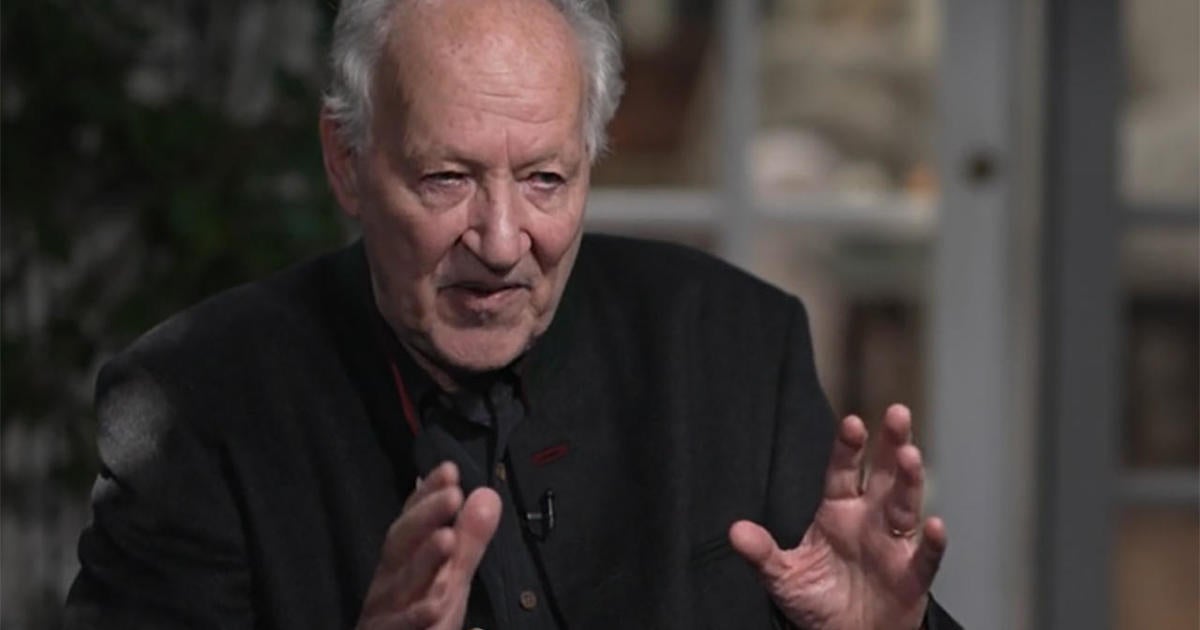Asked if he’d turned his cellphone off, writer-director Werner Herzog said, “I do not have a cellphone. I don’t have to turn off anything. I just want to live and have a real conversation with a real person.”
Herzog got his wish: An authentic conversation not long ago at his home in the Hollywood Hills.
He is a legitimate filmmaking visionary, in Hollywood and around the world, having directed more than 20 feature films and better than 30 documentaries – from a journey to the heart of darkness in the Amazon, to a life among grizzlies in the Arctic.
He’s put it all into a memoir with a title that’s vintage Werner: “Every Man for Himself and God Against All” (Penguin Press).
“A title has to somehow jump at you,” Herzog said. “When you walk by some books and you see this, you stop: ‘Man, what is this?'”
What it is, is the story of a filmmaker unlike any other. “Yes, I have experienced a lot, as if I had lived ten times over already,” he said. “And that’s the beauty of the memoir, is that it’s so condensed. When you read it, you will not be bored.”
Born in Munich, Germany during World War II, Herzog started making films as a teen. He was drawn to characters with impossible dreams: you see it in his 1982 film “Fitzcarraldo,” with a longtime collaborator, Klaus Kinski. The character of Fitzcarraldo wants to build an opera house in the middle of the Amazon rainforest. To do it, he needs to haul a steamship up, then down, a mountain.
Herzog said, “20th Century Fox was interested to finance and produce a film. But they wanted to produce it with a small, plastic replica of a ship in a jungle, a ‘good’ jungle. And they thought, ‘We should do it in the botanic garden in San Diego.’ And I said, ‘No, it has to be really shot in a big jungle, and big rivers, and everything.'”
Without the benefit of CGI, Herzog found his big jungle, his big river. He made the astonishing decision to pull a real 320-ton riverboat over a real mountain to the Amazon River on the other side.
I asked, “It sounds to me like there were moments in ‘Fitzcarraldo’ where maybe for the first time, and maybe for the only time, that you at least feared that maybe the crew stopped believing in you. Is that true?”
“It is true,” Herzog replied. “There were moments where it was very precarious. And only my fire within somehow carried us. The strength of my vision carried everyone along, even though many of them did not believe I could move the ship over the mountain.”
The finished film made believers out of the crew, and the critics. Herzog won best director at Cannes, though “Fitzcarraldo” was nearly a very different movie. Jason Robards originally led the cast, with Mick Jagger playing his assistant. Then, with nearly half the movie shot, Robards got sick and had to be evacuated back to the U.S. The delay cost them Jagger, too – The Rolling Stones were going on tour.
So, Herzog hired Kinski.
He said if Kinski had been unable to do the film, he would have played the character himself: “I would have done it. Because the main task, moving a ship over the mountain, was not cinema anymore. It was the task that I had to deliver. I had to do it. And I was struggling. I wouldn’t have been half as good as Kinski, and not half as good as Jason Robards or Mick Jagger. ‘Thanks, God, on my knees,’ that I didn’t have to play it.”
That’s not to say Herzog isn’t a good actor; he was born to play bad. He’s starred as the villain in “Jack Reacher,” and a sinister figure in “The Mandalorian.” “Well, I was dragged into acting,” he said, “but I enjoy it tremendously, and I do it well. I know I do it well, but only for very specific parts. and I can deliver. But I swear to God, it’s a performance.”
His greatest performance, though, is a love story: his own. Werner Herzog is a hopeless romantic. He fell for photographer Elena Pisetski in the late ’90s. To seal the deal, he sold everything he owned and flew from Germany to the U.S. with nothing but a toothbrush in his pocket and passion in his heart.
“It’s only me; it’s me, only me, the man, the person, and that’s it,” he said of his arrival on Pisetski’s doorstep. “So, I have nothing to offer, only me, myself. And I am in America and I’m in Los Angeles because I fell in love very deeply. And I have been very lucky. I’m not here because of Hollywood. I’m here because I’m in love.”
It’s Herzog’s third marriage; he and Elena have been together now for 28 years. “I’m a very lucky bastard,” he said.
It’s been 63 years since his first film, and Herzog is still at it. And, he promises, there is more to come. “I am working on two feature films,” he said.
“You’re not saturated?” I asked.
“Well, who knows?” Herzog replied. “Ultimately, you’ll have to carry me out from a set feet first. That’s what hopefully is gonna happen.”
Story produced by John D’Amelio. Editor: Emanuele Secci.




